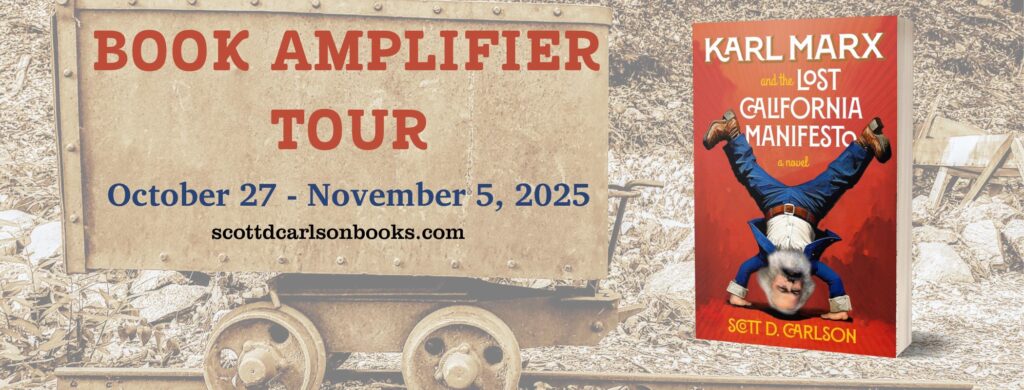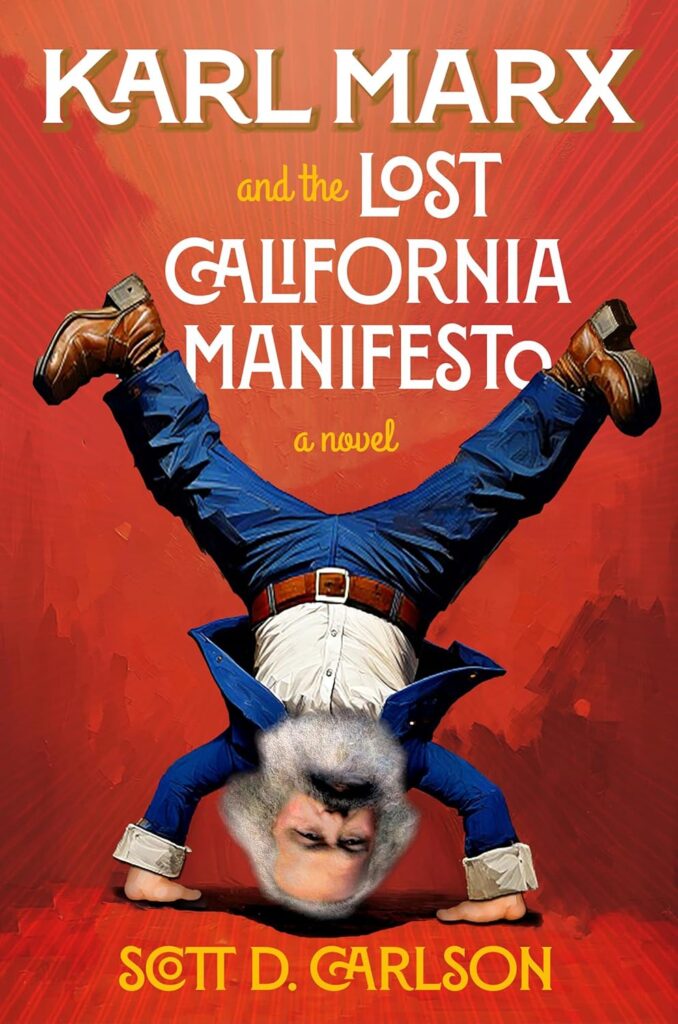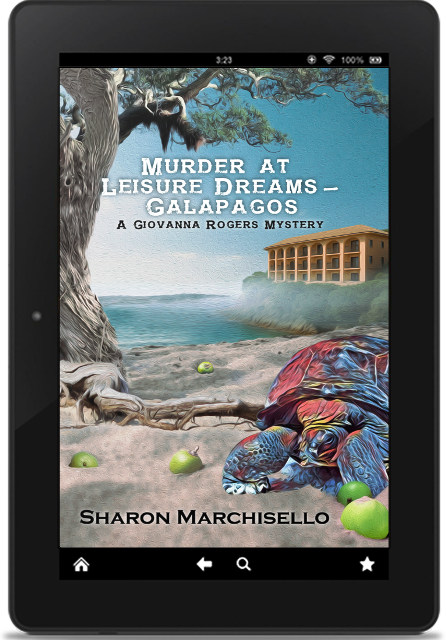This book event is through Author Marketing Experts.
Karl Marx and the Lost California Manifesto book amplifier tour includes a Q&A, author guest post, and exclusive excerpt. Explore all there is to offer, share, comment, shop, subscribe.

Your message has been sent
Book Details

Karl Marx and the Lost California Manifesto by Scott D. Carlson is a smart, funny, and
surprisingly heartfelt tale that reimagines Karl Marx as a gold-hungry 49er navigating the rough
edges of the American frontier.
In 1849, Karl Marx flees London’s creditors and sets his sights on California, hoping to strike
gold and reignite The Revolution. His plans take an unexpected turn when he meets Sixto—a
clever, hard-luck teenager raised in a mission and running from danger. Together they set out
across the Sierra Nevada, dodging desperate miners, corrupt traders, and a pair of inept
Prussian spies eager to reclaim Marx’s stolen Manifesto. Their journey is one of humor and
hardship, filled with outlaws, Miwok tribespeople, and dreamers chasing fortune in a lawless
new world. Through Sixto’s vivid narration, Marx’s idealism clashes with greed and violence,
forcing him to reconsider what revolution and freedom truly mean.
Excerpt
From Lt. Junger and Lt. Fischel
to King Frederick William IV
May 14, 1849
To: His Excellency King of Prussia Frederick William IV
Re: Herr Karl Marx
To our most high King, the greatest sovereign in all of Europe—Ja in all the world! Your servants have cleverly followed, if we do humbly say so ourselves, Herr Marx and his Junge companion to this settlement called Sacramento, in the hinterland of California.
It is a place even more remote and Scheiß-ridden than San Francisco. A flood came and turned the entire settlement into one great cesspool of Scheiß, mud, offal, garbage, and dead beasts.
There are no wonderful water closets here like those your Majesty has at Sanssouci—in fact, there are no water closets at all. Always the whole settlement smells like the hind end of a peasant horse. Expertly disguised as miners from Chili, we left San Francisco on the same steamboat as did Marx, the Junge, and their donkey.
Because of our Chilian dress, we met on the boat the hostility of some drunken Americans, who insisted we must keep first to the aft, then to the forward part of the boat. This conformed perfectly with our plan, as we could then stay close to Marx and his accomplice.
In the morning, we witnessed Herr Marx engage in argument with some of the passengers and then, as seems to be his habit, with the boat captain. Marx cannot tolerate anyone other than himself being the “captain.” As is also his habit of late, he came out on the losing end. He then ordered the boat captain to deliver him and the Junge to the bank of the river. The captain resisted but finally gave in, no doubt thinking it best just to be rid of Marx, and abruptly deposited them on a spit of sand in the river channel.
Soon after, we asked the captain to bank the boat and we disembarked. After fighting our way through the bulrushes, we came out at a point from which we saw Marx and the Junge setting off overland. On the boat, Marx had been engaging in some very odd gymnastics, and he continued these as they set off toward the east. They, and we, did not know that they were headed in the direction of a native village, which they eventually entered.
From a distance we waited as the subversives conducted in the village what we believe to be benign business with an American woodsman. After seeing them leave, we entered the village.
Through the woodsman there, we learned that the natives had been entertained by Marx, and that they expected us to perform for them too. Wanting to please, your servants proudly represented the Prussian nation by performing a very creditable Lauschaer Galopp, for which we received a standing ovation. The woodsman also revealed to us Marx’s probable ultimate destination in the mountains beyond Sacramento. As much as we then wanted to continue with our surveillance, our native hosts said we must,
before leaving, eat a local dish of mashed boiled acorns garnished with bits of tuberous material. We acceded, unfortunately, as almost immediately we were both befallen with, we are sorry to offend your
Excellency, explosiver Durchfall, which disabled us for the rest of the day and that night.
However, the next day, we were able to muster the strength to set off for this sorry settlement that makes a Latvian hamlet seem like Baden-Baden. Here ensued some temporary trouble from which we will soon extricate ourselves and again be hot on the trail of Herr Marx, to wit: We eventually located Marx and the Junge in one of the several houses of drink and gambling—an establishment charmingly referred to locally as a “café chantant.” This house also featured music provided by a French woman and an American
piano player who had to be, we are sure, working together for the first time. The music was not to our taste, nor was the very bad beer—how we greatly miss the beloved brews of home! The French
woman was an apparent lady of the night posing as a mumbling chanteuse. The American played in the style of a Lutheran church organist, and the mismatch resulted in loud catcalls from the surly patrons.
We followed Marx and companion to a gambling table with the intent that we might be able to bankrupt him, but quickly discovered that the table, run by a Mexican card dealer, was exclusively for speakers of Spanish. The confusion caused by this language obstacle was compounded by the unfamiliar game being
played, and further so by having to endure the awful music. Oh how we miss the strain of accordions playing the Hohenfriedberger Marsch in a Biergarten! In short, we have been unusually frugal with your Excellency’s money, but we risked an imprudently large bet in the game and lost. Conversely, Marx, aided by the Spanish-speaking Junge, bet against long odds with what we believe was one of his last coins—and won.
Apparently feeling flush, Herr Marx proceeded to drink several glasses of the lousy beer. Then, in a break in the chanteuse’s “music,” and presumably inspired by her nationality, Marx stood upon a table and began singing the revolutionary Marseillaise anthem.
We were alert that this might be a signal or coded message to other revolutionaries in and around the “chantant,” but the catcalls grew very loud and Herr Marx was struck by bottles thrown by a table of
Australians. One of the Australians then turned his attention to us.
He wanted to know “what the hell you’re gawkin’ at” and wrongly accused us of Sodomitic desires. His compatriots soon joined in abusing us. We could not speak openly without giving away our identities to Marx. And we are not French puffs “de crème.” One thing led to another, and we found ourselves outside in a fistfight with the Australians. We fought bravely but were outnumbered and were pitched into a mudhole caused by the recent flooding. To add insult to injury, the Australians exposed us to several lewd gestures which were of a nature unlike any we have ever seen, even in a Prussian enlisted men’s barracks. However, the Australians received a comeuppance of sorts as they—and we, too, unfortunately—were
arrested by constables and arraigned by the local justice of the peace, who apparently makes his living by taxing foreigners with outrageous fines, nonpayment of which results in confinement.
We had only a small sum left after the gambling table and thus are enduring an unpleasant stay in the “hoosegow” with the Australians but expect to be released shortly.
Your Excellency may be assured that despite losing Herr Marx’s trail for a short time, we are confident we will be able to find him, as we know of his intended destination. However, we regret to report that we are very short of funds. Our accidental gambling loss has drained our “treasury,” so to speak—please send money, your Highness! You may send it to Sacramento, in care of our cover names, “Hozay and Horhay the Chilians.”
We thank you profusely and remain deeply dedicated to your service.
Your servants,
Lt. Ernst Junger
Lt. Franz Fischel
Author Details

Scott D. Carlson has lived a life as varied as his fiction—working as a farmhand, Army cook,
teacher, lawyer, and more. His eclectic background infuses his writing with wit, empathy, and an
understanding of life’s contradictions. A graduate of NYU’s Creative Writing program, Carlson
lives in the San Francisco Bay Area, where the Gold Rush’s echoes still shape the imagination.
Learn more on his website.
Writing Process & Creativity
How did you research your book?
I’m lucky to have a good public library, and access to a university library, that both have a lot of
books containing first-hand accounts by “49ers,” of their experiences coming to California and
what it was like in the mountains. A lot of these books are online, via the Internet Archive or
Project Gutenberg, which are great resources.
What’s the hardest scene or character you wrote—and why?
I think the “action” scenes in the book are difficult. For example, the duel, and later Sixto and
Marx roping the Prussians. I want readers to be able to “see” these clearly in their imaginations,
so you have to be pretty detailed about who does what in space, and when and how, etc.
Where do you get your ideas?
The idea for this book came from reading a biography of Marx. In 1850, he and Friedrich Engels
both seriously considered coming to America, but were so broke they couldn’t afford the boat
fare. I had to wonder: What if he had come? Reading about gold miners’ lives also gave me
more ideas than I could handle.
What helps you overcome writer’s block?
Ego. Seriously, the writer Flannery O’Connor said something like “Just get behind your
machine!” And another writer, E.L. Doctorow, who I studied with, said that he was sitting at his
desk staring at a wall, started writing about the wall, and it turned into his novel Ragtime.
Your Writing Life
Do you write every day? What’s your schedule?
I try to write every morning, Monday to Friday, for anywhere from 2 to 4 hours, sometimes a little
longer. Weekends are mostly reserved for other parts of my life.
Where do you write—home, coffee shop, train?
I can’t write anywhere but home, and when I’m there, not anywhere but in the little world of my
“office.” With the two doors closed. I can stare out the window there, at a bunch of oak trees.
Behind the Book
If your book became a movie, who would star in it?
Good question, but tough. The real Marx would have been 31 years old in 1849. If Timothy
Chalamet can pull off Bob Dylan, he could maybe do Marx. I haven’t really watched the show,
but I’m wondering if a couple of the guys in Reservation Dogs could play Sixto. He’s just as
important, or more so, than Marx.
Which author(s) most inspired you?
There’s a whole host of them, but to name a few: J.M. Coetzee; Saul Bellow, John Updike, Joan
Didion, Hilary Mantel; Vladimir Nabokov, and Richard Ford.
Fun & Lighthearted Qs
What’s your go-to comfort food?
I’m a chocoholic. But for “real” food I like…beans and lentils? And eggs. Do they count?
What are you binge-watching right now?
I don’t do a lot of bingeing, but recently I did do season three of The White Lotus. I was
prepared to not like it, but I got hooked. I thought it was much better than season one.
If you could time-travel, where would you go?
If I knew I would survive them, almost any of the epic early sea voyages, like Magellan’s and
Drake’s circumnavigations, or Cook’s voyages. But the food would have been horrible. No
comfort food there.
What 3 books would you bring to a desert island?
The American Heritage Dictionary, so I wouldn’t forget my language, and, believe it or not,
entertain myself with it. Probably a complete collection of New Yorker cartoons, for when I need
a laugh. And “The Yale Shakespeare,” his complete works.
What’s something that made you laugh this week?
A sentence that I wrote in a novella I’m now writing. It’s a good sign, I think, if I can laugh at my
own writing.
Author Guest Post
While Researching My Story, I Discovered…
There’s a lot that’s been written about the California gold rush, by those who were in it, and then
later by historians, etc. Read these accounts and histories and you will be astonished. Tens of
thousands of people–mostly men–came from all over the world: Mexico, China, Australia, South
America, all kinds of Europeans. And, of course, Americans of all stripes, from farmboys up to
doctors and New York lawyers. First, you often see what kind of hope, or desperation, drove
someone to choose to leave whatever kind of life they were living and travel thousands of miles
for the chance to get rich. And then they had to figure out how to get there. Remember, this is
the late 1840s, so their journeys just getting to California are epic. For most, they had to
undertake either a long, dangerous sea voyage, or go overland across a continent, much of
which was, other than for Native Americans and a very few other Americans, a largely
uncharted “wild west.” And you couldn’t do this alone, so you often had to join strangers and
travel with them, which would be a challenge itself.
Apart from the huge logistic challenges, there were diseases, storms, hunger, accidents, and
conflicts with natives. Once in California, these tens of thousands of newcomers essentially
invade the long-existing cultures of the “Californios”–the descendants of Mexicans who settled
early California– and the Native Americans. This collision alone was enormous, and had a huge
influence on shaping the California we know today. Then you contain this hyper-greedy horde in
a relatively small area, in a couple of fast-growing towns and then in the mountains. The mix of
races and nationalities, of greed and testosterone and desperation (and let’s not forget
whiskey), often produced shocking violence. There was a great disparity of luck–one man gets
filthy rich; his neighbor starves and gets scurvy. For me the one word that most comes to mind
when reading about the gold rush is “wild.” The whole scene was the wildest of the “wild west.”
Tour Schedule
October 29th
The Violet West
http://www.thevioletwest.com/blog
October 30th
PhyllisJonesPisanelliReviews
http://pjp-reviews.com
October 31st
The Faerie Review
https://www.thefaeriereview.com
November 3rd
Country Mamas With Kids
https://countrymamaswithkids.com
November 5th
@whatnolareads
https://www.instagram.com/whatnolareads
Anytime between 10/27-11/5
@aibibyreads
http://instagram.com/aibibyreads
Chapter Break
https://chapterbreak.net
A Wonderful World of Words
https://awonderfulworldofwordsa.blogspot.com
Riley’s Hobbies & Books
https://www.instagram.com/rileyshobbiesandbooks
Stacey-Ann Says
http://staceyannsays.com
Sarandipity’s
https://sarandipitys.com
What Is That Book About
http://www.whatisthatbookabout.com
Amy’s Booket List
http://amysbooketlist.com




